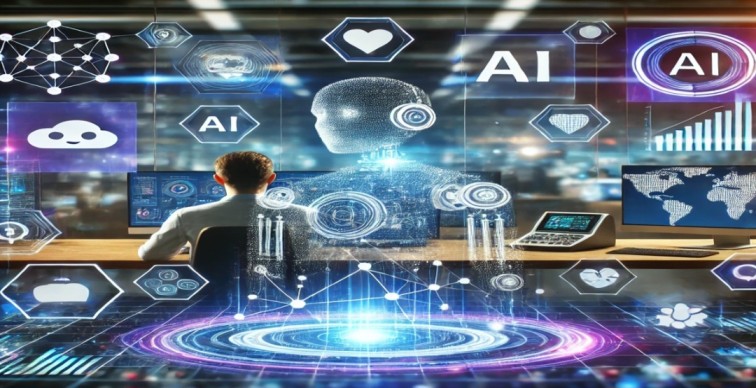The world of digital marketing has transformed dramatically in recent years, with Artificial Intelligence (AI) emerging as a key player. Businesses are leveraging AI to streamline processes, improve customer experiences, and boost ROI. Here’s a deep dive into how AI is revolutionizing digital marketing in 2025.
1. AI-Powered Personalization
One of the most impactful uses of AI in digital marketing is personalization. AI algorithms analyze customer behavior, preferences, and purchase history to deliver tailored experiences. For example:
- Dynamic Content: AI tools like Dynamic Yield customize website content based on a user’s browsing habits.
- Email Campaigns: Tools such as Mailchimp’s AI assistant help craft personalized email subject lines and content for higher engagement.
- Product Recommendations: E-commerce platforms use AI to recommend products, increasing the likelihood of conversion.
Personalization not only enhances user experience but also drives customer loyalty and higher conversion rates, making it a cornerstone of modern marketing strategies.
2. Chatbots and Virtual Assistants
AI-powered chatbots and virtual assistants are becoming integral to customer service and engagement. These tools:
- Provide 24/7 customer support.
- Handle frequently asked questions, reducing human intervention.
- Guide customers through purchase decisions, mimicking human interactions.
Popular tools like Drift and Intercom enable businesses to create seamless conversational marketing experiences. Chatbots are especially beneficial for e-commerce platforms, where instant responses can mean the difference between a sale and a lost customer.
3. Enhanced Data Analytics
AI is revolutionizing data analytics by providing actionable insights faster than ever. Tools like Google Analytics 4 and HubSpot use AI to:
- Predict customer behavior.
- Identify trends in massive datasets.
- Optimize marketing strategies based on performance metrics.
Marketers can make data-driven decisions with precision, ensuring campaigns resonate with their target audience. With predictive analytics, businesses can forecast market trends and adjust their strategies proactively.
4. AI in Content Creation
Creating high-quality content is a cornerstone of digital marketing. AI tools are aiding this process by:
- Generating written content: Platforms like Jasper and ChatGPT help create blog posts, social media updates, and ad copies.
- Enhancing visual content: Tools like Canva and Adobe Sensei use AI to suggest designs, layouts, and edits.
- Automating video creation: Tools such as Synthesia allow businesses to create AI-generated video content quickly and affordably.
AI-generated content ensures consistency and saves time, allowing marketers to focus on strategy and creativity. However, human oversight remains crucial to maintain authenticity and brand voice.
5. Predictive Marketing
AI enables predictive marketing by forecasting trends and customer needs. Businesses use predictive analytics to:
- Anticipate market trends.
- Identify high-value leads.
- Optimize ad targeting to reduce wasted spend.
For instance, Salesforce Einstein uses AI to predict customer behavior and suggest next steps for marketing campaigns. Predictive marketing ensures that resources are allocated efficiently, maximizing ROI.
6. Voice Search Optimization
With the rise of voice-activated devices like Alexa and Google Assistant, businesses are optimizing for voice search. AI tools:
- Analyze natural language patterns to understand user intent.
- Optimize content for conversational keywords.
- Ensure websites are voice-search friendly, boosting SEO rankings.
Voice search is transforming how users interact with search engines, making it essential for businesses to adapt their SEO strategies to stay competitive.
7. Programmatic Advertising
AI is transforming digital advertising through programmatic ad buying. Platforms like Google Ads and Facebook Ads use AI to:
- Automate ad placement based on audience data.
- Optimize bidding strategies in real-time.
- Deliver highly targeted ads to niche audiences.
This approach maximizes ROI while minimizing manual efforts. Programmatic advertising is particularly effective in reaching specific demographics with precision.
8. Sentiment Analysis
Understanding customer sentiment is vital for brand success. AI tools perform sentiment analysis by:
- Monitoring social media mentions and comments.
- Analyzing customer reviews and feedback.
- Providing insights into public perception of a brand or product.
Tools like Brandwatch and MonkeyLearn help businesses stay ahead of potential PR crises and improve customer satisfaction. Sentiment analysis allows brands to gauge their audience’s mood and respond appropriately.
9. Automated Marketing Workflows
AI streamlines marketing workflows, saving time and resources. Tools like Marketo and ActiveCampaign use AI to:
- Automate lead nurturing.
- Schedule and optimize email campaigns.
- Segment audiences with precision.
Automated workflows ensure that repetitive tasks are handled efficiently, allowing marketers to focus on strategic initiatives.
10. Real-Time Decision Making
AI enables real-time decision-making in digital marketing by analyzing data instantaneously. For example:
- Dynamic pricing models adjust product prices based on demand and competitor activity.
- Real-time A/B testing optimizes landing pages and ad copies during live campaigns.
- Social media algorithms prioritize posts based on user engagement predictions.
Real-time capabilities ensure that businesses can adapt quickly to changing market conditions and customer behavior.
11. AI in AR/VR Experiences
Augmented Reality (AR) and Virtual Reality (VR) are becoming more accessible, and AI plays a crucial role in enhancing these technologies. Businesses are leveraging AI to:
- Create immersive virtual shopping experiences.
- Develop interactive product demos.
- Enhance user engagement through gamification.
For example, furniture retailers use AR to allow customers to visualize products in their homes before purchase, improving the shopping experience.
12. Hyper-Personalization and Ethical AI
As AI advances, hyper-personalization is becoming the norm. However, businesses must prioritize ethical AI practices to maintain transparency and trust. This includes:
- Ensuring data privacy.
- Avoiding algorithmic biases.
- Communicating how AI is used in marketing.
Ethical AI practices not only protect customers but also enhance brand reputation in the long term.
AI is no longer a luxury but a necessity in digital marketing. By leveraging AI tools and strategies, businesses can stay competitive, foster deeper customer connections, and achieve greater success. Whether it’s through personalization, predictive analytics, or automation, AI is undoubtedly shaping the future of marketing.










